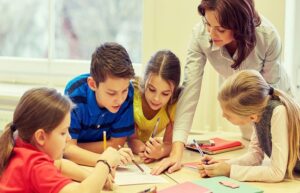Data in the psychology of learning (which have existed for almost fifty years) show that we can play on the memorization, concentration and motivation of the student. For example, by asking students questions every twenty-five minutes or so, they are encouraged to test themselves, to self-assess what they have learned. The challenge is for the student to become independent and get into the habit of doing this alone.
Another observation: correcting an assignment three weeks after a student has returned it is ineffective. The brain learns by trial and error and it needs to do this in a short time. To achieve this, the teacher can use digital with instant corrections. We have thus discovered that learning to write on a tablet is more effective than on paper: when the children draw the letters, the software shows them the expected gesture in real time. Finally, we know that summative evaluation destroys motivation. It is better to carry out a formative evaluation, presenting to the student what he has acquired and what he still needs to improve. Setting clear goals for learners before getting into the learning content also helps them to persevere.
You have worked on the application of these techniques to pupils from underprivileged backgrounds. Why can the latter particularly benefit from knowledge about the brain?
Because this knowledge makes it possible to compensate for educational inequalities due to the pupils’ social background. Metacognitive knowledge and strategies are less good in children from disadvantaged backgrounds. This partly explains, from kindergarten, the educational inequalities in the development of language and the acquisition of mathematics. It is therefore essential that we can teach this metacognitive knowledge and strategies very explicitly. For example, it is essential to explain to these students the importance of attention in class for their memorization, to show them how to evaluate what they have learned, in short, to give them the keys to learning well. Kindergarten should be the place where we learn to learn. We should then only go into the fundamentals (reading, writing, counting).
Do teachers rely on this knowledge?
It is difficult to know, but we sense a growing appetite for these questions. It is stronger among 1st degree teachers . In the 2nd degree , the system of “ cogni’classes ”, brought together up to 3,000 classes in colleges and high schools. We also see in the academic plans more and more training proposals on these themes. If we want to have an impact on learning, teachers must acculturate to this scientific knowledge. Today, initial teacher training models make no room for them. They usually only have three hours on the cognitive development of the child.
What do teachers have to gain by using these techniques in the classroom?
GB: Those who work with us via calls for projects testify to renewed motivation and creativity. This puts them back in positions of pedagogical questioning. With neuroscience, they become researchers, take a fresh look at certain students… Participating in research also gives them a scientific culture. More broadly, applying effective and scientifically proven learning mechanisms in the classroom means participating in the transformation of our education system so that it makes all students succeed. I invite teachers who want to get started to consult our science popularization blog www.le21dulapsyde.com , to find out about “cogni’classes”… and to get trained.
Can an institution participate in a research project you are leading?
Yes, in two ways. There is the research that we conduct at the LaPsyDÉ laboratory. We work by calls for applications with private and public establishments, from the small section of kindergarten to the university, near the laboratory therefore rather in the Paris region. For some projects students come to the lab especially for projects that require recording brain activity while students are solving problems, reading or counting. For other projects, researchers go to schools to collect data. At the end of the project, we then present to the pedagogical team and to the students what we have observed and what this implies in terms of pedagogy…
Teachers can take a more active part in our research in an open and participatory research process using an online platform. For four years, we have indeed had a partnership with Nathan editions which allows us, via the lea.fr site, to offer all classes in France and elsewhere participation in collaborative research. The principle, this time, is to co-construct research projects with teachers. We do not intervene in class. They are the ones who co-construct the research, conduct the experiments and collect the data. Recently, we launched an online experiment with nearly 4,000 middle school students and 500 teachers on the theme of learning to learn. We explained to them how the brain works, the role of sleep and stress on learning.
What fields of research, in relation to learning, do you think remain to be explored?
I think the issue of parents is still a blind spot in our work. We focused a lot on the teachers. We therefore launched a project to intervene with parents from underprivileged backgrounds, whose children are educated in REP and REP+ in the academies of Paris and Versailles. We are going to offer one intervention per week for twenty-four weeks (a short video that parents will receive on their laptop and which will explain a neuroscience concept followed by an activity to do with their child) and see if this reduces educational inequalities.





Leave a Reply
You must be logged in to post a comment.